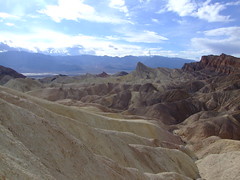Rigorously struggle against bourgeois individualism
I heard yesterday, with this post half-completed for a couple of months, that Antonioni had died.
 LA is beautiful. I’m not sure if that’s the point Antonioni is trying to make in Zabriskie Point, but he makes it anyway. And Death Valley, as it appears in the film, is beautiful too. What are we to make of the pairing here? The easy way to read it would be as a romantic opposition: the unspoilt beauty of the desert vs. the degenerate construction of the city. But Antonioni blocks this interpretation whenever it appears as a possibility in the film. In part, this is necessitated by the very nature of LA—as a city, its so strangely unfinished and temporary, a landscape of shacks thrown up along monstrously overgrown dirt roads; any competent depiction of LA (and Antonioni’s is more than competent) cannot posit the city as civilization to nature’s other.
LA is beautiful. I’m not sure if that’s the point Antonioni is trying to make in Zabriskie Point, but he makes it anyway. And Death Valley, as it appears in the film, is beautiful too. What are we to make of the pairing here? The easy way to read it would be as a romantic opposition: the unspoilt beauty of the desert vs. the degenerate construction of the city. But Antonioni blocks this interpretation whenever it appears as a possibility in the film. In part, this is necessitated by the very nature of LA—as a city, its so strangely unfinished and temporary, a landscape of shacks thrown up along monstrously overgrown dirt roads; any competent depiction of LA (and Antonioni’s is more than competent) cannot posit the city as civilization to nature’s other.
Likewise, the desert is never quite allowed to settle into an untroubled naturalness. Certainly, Antonioni’s LA, a montage of advertising hoardings and riot-police brutality, manifests the deeply psychotic nature of late capitalism. But the desert is no less psychotic. Daria, the female lead, stops to make a phone call in a small town between LA and Phoenix. The phone is located in a bar that is built from neon signs and psychologically damaged regulars (“You used to be heavyweight boxing champion of America? That’s swell.”). Daria is set upon by a group of rock-throwing kids, who uneasily echo the rioting students in LA. “Can we have a piece of ass?” one of the kids asks. “Would you know what to do with it?” Daria responds. Whatever else the film is, it is not an uncomplicated advocacy of the hippie utopia of nature and free love.
This brings up the third, most complicated and troubling, reason to reject the romantic construal: it is precluded by the film’s overall political logic. The first scene sees a group debating tactics for the following day’s student strike. Aside from containing one of the most passionate defenses of minority leadership I’ve seen in a film, the debate turns around questions of agitation and organization. What will radicalize white students? The Black leaders (one of them played by Kathleen Cleaver) are uncompromising: either white students’ own experiences will radicalize them, or they remain enemies. One of the students quotes Mao: “rigorously struggle against bourgeois individualism.” The alternative to a romantic reading is, I think, to see the film as a meditation on this question. What does it mean, what will it take, what might it cost, to come to understand revolution as a struggle against bourgeois individualism?
The genius of Zabriskie Point‘s pairing of Los Angeles and Death Valley, then, is that it makes them the opposite of the romantic contrast, seeing them both as interstitial. Because of this, it allows us to see them both as interstitial, and so raises what I’m increasingly finding to be the central question of revolutionary politics: how can we see these interstitial, other, visions, as something that is not simply an individual, hence powerless, fantasy?